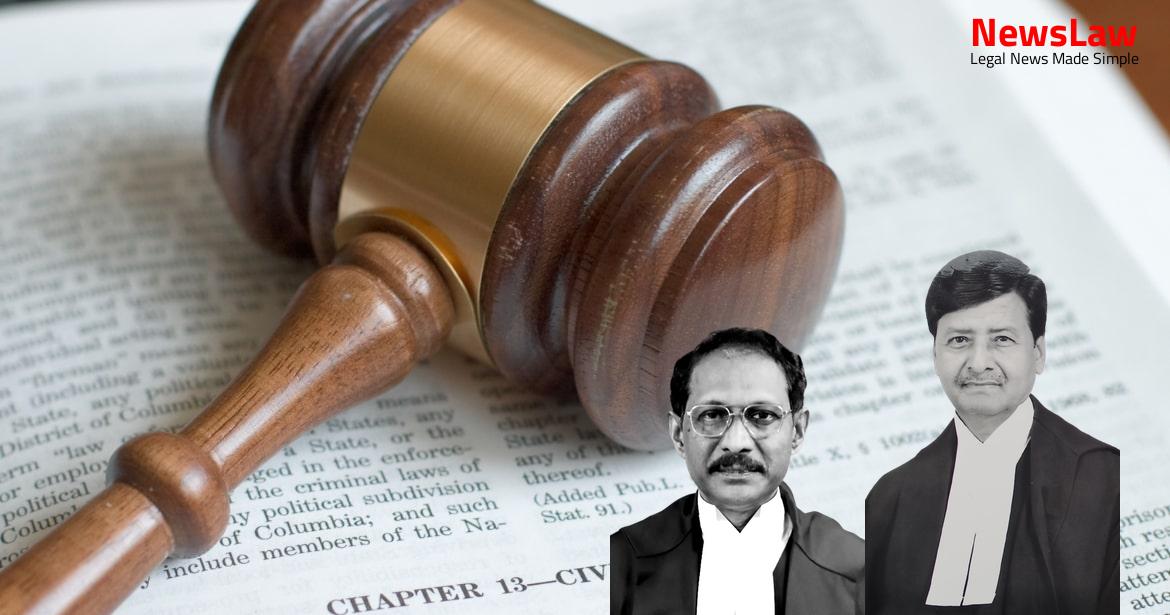circle
The relevant facts in brief to appreciate the controversy are that respondent nos.1-3 have availed three loan facilities vide Mortgage Loan of Rs.10 lakhs, Cash Credit Loan of Rs.8 lakhs and Car Loan of Rs.8 lakhs from the respondent Bank (secured creditor) after executing necessary security documents. Finally, the loan accounts have been classified as Non-Performing Assets (NPAs) on 30 September, 2012 and in furtherance, the respondent Bank initiated recovery proceedings under the provisions of the SARFAESI Act, 2002 and issued demand notice dated 15 November, 2012 calling upon the respondent borrowers/guarantor to repay and discharge the outstanding loan amount with interest and costs within 60 days. After taking possession of the mortgaged property, on 29 November, 2014, the respondent Bank (secured creditor) issued a notice prior to e-auction to the respondent borrowers after obtaining valuation of the subject property from an approved valuer in terms of Rules 8(5) and 8(6) of the Security Interest (Enforcement) Rules, 2002 (hereinafter being referred to as the “Rules, 2002”) calling upon the borrowers/guarantor to repay the outstanding loan amount as demanded. That the aforesaid e-auction sale notice came to be challenged by the respondent borrowers before the Debts Recovery Tribunal and by an interim order dated 26 March, 2015, the Tribunal directed the respondent Bank (secured creditor) to proceed with the auction sale of the secured asset scheduled on 28 March, 2015 with a further direction not to issue the sale certificate provided the respondent borrowers deposits Rs.6 lakhs within 15 days from the date of the said order.
Also Read: https://newslaw.in/case-type/civil/judgment-on-execution-of-lease-deed-for-remaining-land/
The fact to be noticed at this stage is that since the dispute was on-going before the Tribunal and the respondent borrowers have failed to comply with the interim order of the Tribunal dated 26 March, 2015 to deposit Rs.6 lakhs within 15 days from the date of passing of the order by 10 April, 2015, the respondent Bank (secured creditor) proceeded with the auction sale pursuant to the e-auction sale notice dated 25 February, 2015 in terms of liberty granted by the Tribunal. It is to be noticed that the day when the order came to be passed by the Tribunal on 17 April, 2015 granting further extension of 15 days’ time to the respondent borrowers to deposit a sum of Rs.6 lakhs, auction sale was finalised and sale certificate dated 15 April, 2015 was issued in favour of the appellant (auction purchaser). In addition, further objection raised by the respondent borrowers was that in terms of Rule 9(4) of the Rules, 2002, the auction price was to be deposited by the auction purchaser within 15 days which expired on 10 April, 2015 but it was admittedly deposited by the auction purchaser (appellant) on 15 April, 2015 which is in clear breach of Rule 9(4) of the Rules 2002, in consequence thereof, the e-auction sale notice and all further proceedings initiated pursuant thereto deserve to be declared null and void.
Although it was an appealable order before the Debts Recovery Appellate Tribunal, still the respondent borrowers approached the High Court under Article 226 of the Constitution and the Division Bench of the High Court reversed the findings returned by the Tribunal on the premise that there was an error in the description of the scheduled property in e-auction sale notice dated 25 February, 2015 and that was considered to be a serious infirmity in the process and cannot be sanctified and further held that since the appellant (auction purchaser) failed to deposit balance 75% of the bid amount within the stipulated time of 15 days which ought to have been deposited by him on or before 10 April, 2015, that admittedly deposited by him on 15 April, 2015, is in clear breach of Rule 9(4) of the Rules, 2002 and accordingly, set aside all the proceedings initiated from the stage of Section 13(2) of the SARFAESI Act, 2002 till the delivery of physical possession of the scheduled property to the auction purchaser (appellant) by the respondent Bank by an order dated 23 November, 2018, which is the subject matter of challenge before us. Learned counsel for the appellant submits that so far as the description of the scheduled property put to auction is concerned, from the stage when the initial notice was issued by the respondent Bank (secured creditor) under Section 13(2) of the SARFAESI Act, 2002, the mortgaged property was described as “Door No.12-3- 393” instead of “Door No.12-3-39”, but it was never the case of the respondent borrowers either before the Tribunal or before the High Court that the description in the e-auction sale notice indicating the boundaries, measurement, ward number, block number, TS number and extent of land, etc. Learned counsel submits that the appellant was ready and willing to deposit the balance of 75% of auction bid before 11 April, 2015 but because of the intervention made by the Tribunal that created confusion in the mind of the appellant and for the aforesaid reason, delay of four days was caused in depositing the balance 75% of the bid amount which was deposited on 15 April, 2015 and the time under Rule 9(4) of Rules, 2002 is not that sacrosanct. Learned counsel further submits that the conduct of the respondent borrowers is equally to be looked into for the reason that when the e-auction sale notice came to be published by the respondent Bank, simultaneously, application was filed by the respondent borrowers before the Tribunal on 23 March, 2015 and interim order was passed by the Tribunal on 26 March, 2015 to see the bonafides of the respondent borrowers, they were directed to deposit Rs.6 lakhs within 15 days from the date of order but admittedly, the respondent borrowers have failed to deposit with the respondent Bank and sought further time to deposit, on which order came to be passed on 17 April, 2015 and they are only interested to nullify the e-auction proceedings initiated by the respondent Bank either by taking legal recourse or by any other mechanism, which is possible under the law and after failed to deposit the amount as directed by the Tribunal at least, they are not entitled to seek any indulgence from the High Court in the writ jurisdiction filed at their instance under Article 226 of the Constitution. Similarly, Rule 9(3) which provides that the purchaser shall pay a deposit of 25% of the amount of the sale price on the sale of immovable property also indicates that the said provision is mandatory in nature. For the purposes of Rule 9(4), the expression “written agreement” means nothing more than a manifestation of mutual assent in writing.
we think must mean the secured creditor, borrower and auction-purchaser.”
Learned counsel for the respondent borrowers further submits that description of the scheduled property has also created a confusion in the minds of the participants in the e-auction sale notice and in support thereof, submits that when the property was mortgaged and security interest was created, the value of the property assessed was much higher in value than what being indicated as the reserve price by the respondent bank in the e-auction sale notice pursuant to which the auction proceedings were initiated and because of the wrong description of the property put to auction, certainly inference can be drawn that property could not have fetched the value it ought to have fetched and that is the reason the High Court has interfered with and set aside the notice under Section 13(2) of the SARFAESI Act, 2002 and all other consequential proceedings initiated by the respondent Bank, and therefore, needs no further interference of this Court.
Learned counsel for the respondent Bank (secured creditor) has raised an objection that order of the Tribunal was appealable order before the Debts Recovery Appellate Tribunal under Section 18 of the SARFAESI Act, 2002 and the petition filed by the respondent borrowers directly before the High Court against the order of the Tribunal was not maintainable and for the delay in depositing the balance 75% of the bid amount, respondent Bank has tendered a reasonable justification and also filed a counter affidavit before this Court wherein, it has specifically stated that though the auction purchaser was ready to pay the balance of 75% of the bid amount on time, it is the respondent Bank who requested the auction purchaser to wait for some time because the respondent borrowers were negotiating with the Bank at that point of time in light of the interim order dated 26 March, 2015 passed by the Tribunal and that was the reason for which the delay of four days was caused in depositing the balance 75% of the bid amount, which ought to have been paid by 11 April, 2015 but actually deposited by 15 April, 2015.
number, etc., there is no door number existing in the locality/vicinity as “Door No.12-3-393”, but no prejudice has been caused to the respondent borrowers that vitiate the auction proceedings and further submits that after depositing 75% of auction bid amount on 15 April, 2015, sale certificate was issued and possession was later transferred to the auction purchaser (appellant herein). To complete the facts, learned counsel for the respondent Bank further submits that on 15 April, 2015 after receiving the complete bid amount of Rs.64,23,000/- the value of property under e-auction and after adjustments of the outstanding loan accounts and other ancillary charges, the surplus amount remain payable to the borrowers of Rs.16,30,000/- which was offered to the respondent borrowers and since they failed to accept the balance amount, it was accordingly kept in FDR and at present, the aforesaid amount is lying in FDR and with accumulation of interest, the said amount has come to approximately Rs.18.80 lakhs, which is due and payable to the respondent borrowers and it can be transferred to the borrowers/guarantor in compliance of the order of this Court.
On account of default, the loan amounts of the respondent borrowers were classified as Non-Performing Assets (NPAs) and the bank issued a demand notice dated 15 November, 2012 under Section 13(2) of the Act which later came to be published in Hindu (English) and Eenadu (Telugu) daily newspapers on 5 December, 2012 and later possession notice dated 14 February, 2013 came to be published in Hindu (English) and Eenadu (Telugu) daily newspapers on 20 February, 2013 and after initiating proceedings under Section 14 of the Act, the respondent Bank took possession of the scheduled property under the orders of the District Collector from the respondent borrowers on 23 June, 2013. It may be relevant to note that in the description of the property under Sections 13(2) and 13(4) of the Act, door number indicated was “12-3-393” in place of “12-3-39” and this question about the alleged error in the door number of the mortgaged property was available to the borrowers in the first round of litigation before the Tribunal, if at all, it has any material bearing in reference to the proceedings initiated by the respondent Bank (secured creditor), but the proceedings initiated at the instance of the respondent borrowers before the Tribunal came to be dismissed by a judgment dated 12 December, 2014 and no further appeal was preferred and accordingly it has attained finality. 25.02.2015 and however the Respondent Bank is hereby directed not to issue the sale certificate in favour of the highest bidder in the auction subject to the condition that the Applicant shall deposit a sum of Rs.6.00 lakhs directly with the Respondent Bank within 15 days from today.
The extract of the order dated 17 April, 2015 is reproduced hereinbelow: “The Applicant is hereby directed to deposit the said sum of Rs.6.00 lakhs into the ‘interest bearing no-lien account’ with the Respondent Bank within 15 days from 10.04.2015, as sought by the Applicant, and accordingly, the Respondent Bank and the Auction Purchaser are hereby directed to maintain status-quo. 31,. The order of the Tribunal dated 1 August, 2019 was an appealable order under Section 18 of the SARFAESI Act, 2002 and in the ordinary course of business, the borrowers/person aggrieved was supposed to avail the statutory remedy of appeal which the law provides under Section 18 of the SARFAESI Act, 2002 in the absence of efficacious alternative remedy being availed, there was no reasonable justification tendered by the respondent borrowers in approaching the High Court and filing writ application assailing order of the Tribunal dated 1 August, 2019 under its jurisdiction under Article 226 of the Constitution without exhausting the statutory right of appeal available at its command.
Satyawati Tondon & Others, was concerned with the argument of alternative remedy provided under the SARFAESI Act, 2002 and dealing with the argument of alternative remedy, this Court had observed that where an effective remedy is available to an aggrieved person, the High Court ordinarily must insist that before availing the remedy under Article 226 of the Constitution, the alternative remedy available under the relevant statute must be exhausted. While expressing the aforesaid view, we are conscious that the powers conferred upon the High Court under Article 226 of the Constitution to issue to any person or authority, including in appropriate cases, any Government, directions, orders or writs including the five prerogative writs for the enforcement of any of the rights conferred by Part III or for any other purpose are very wide and there is no express limitation on exercise of that power but, at the same time, we cannot be oblivious of the rules of self- imposed restraint evolved by this Court, which every High Court is bound to keep in view while exercising power under Article 226 of the Constitution. and the particular legislation contains a detailed mechanism for redressal of his grievance.”
In the instant case, although the respondent borrowers initially approached the Debts Recovery Tribunal by filing an application under Section 17 of the SARFAESI Act, 2002, but the order of the Tribunal indeed was appealable under Section 18 of the Act subject to the compliance of condition of prior deposit and without exhausting the statutory remedy of appeal, the respondent borrowers approached the High Court by filing the writ application under Article 226 of the Constitution. The High Court under the impugned judgment has non-suited the present appellant (auction purchaser) on the premise that there is an error in the description of the door number of the property and instead of “12-3-39”, it was indicated as “12-3-393”, although there was no error in the description of the property rather the dimensions with measurement and boundaries were properly indicated of the mortgaged property and on the premise that Rule 9(4) of the Rules has not been followed by the appellants by depositing 75% of the bid amount which ought to have been deposited by 11 April, 2015, instead it was deposited on 15 April, 2015. At the same time, the borrower failed to demonstrate that because of a typographical inadvertent error in door number, as indicated above, the property could not have fetched the value as it ought to have fetched and that apart, there was no documentary evidence placed on record to substantiate the kind of prejudice, if any, being caused.
It is true that the secured creditor is under an obligation to undertake the exercise and cross-check the description of the mortgaged property at the stage when the initial proceedings under Section 13(2) are initiated or in the later consequential proceedings, but at the same time, mere typographical error due to inadvertence which has not caused any prejudice to the borrowers, that in itself could not be considered to be the ground to annul the process held by the secured creditor which, in our view, is in due compliance with the requirement as contemplated under the provisions of Rules, 2002 and this was extensively considered by the Tribunal and that apart, it is not the case of the respondents that participants in e-auction sale are misguided because of the error in description of the property put to auction and when there is no ambiguity with regard to the detailed description of the mortgaged property put to auction, mere mentioning of the door number “12-3-393” instead of “12-3-39” is inconsequential and does not vitiate the auction proceedings held on 28 March, 2015. It will be relevant to note that amendment was made in Rule 9(4) and Rule 9(5) of the Rules, 2002 of which reference has been made by GSR No.1046(E) dated 3 November, 2016 effective from 4 November, 2016 and it reads as under: “
(4) The balance amount of purchase price payable shall be paid by the purchaser to the authorised officer on or before the fifteenth day of confirmation of sale of the immovable property or such extended period
[as may be agreed upon in writing between the purchaser and the secured creditor, in any case not exceeding three months]. This Court, while examining the pre-amended Scheme of Rule 9(4) in judgment in General Manager, Sri Siddeshwara Cooperative Bank Limited (supra) was of the view that the period which is referred to in Rule 9(4) is not that sacrosanct and may be extended if there is a written agreement between the parties and since parties to the written agreement is not defined in Rule 9(4), this Court was of the view that it covers into its fold the secured creditor, the auction purchaser and the borrower, but later the legislature taking into consideration the judgment of this Court made its intention clear by making an appropriate amendment in Rule 9(4) of the Rules, 2002 which came into effect by a notification dated 3 November, 2016 effective from 4 November, 2016. In the instant case, although there was no written consent by all the three partners, namely, secured creditors, borrowers and auction purchaser, as being referred to by this Court in General Manager, Sri Siddeshwara Cooperative Bank Limited (supra), but this fact cannot be ruled out that in the instant case, the peculiar situation has come forward when the respondent borrowers in the first instance approached the Tribunal assailing the e-auction notice issued by the respondent Bank (secured creditor) and were able to secure an interim order from the Tribunal dated 26 March, 2015 permitting the auction proceedings to continue, subject to the condition that the borrower shall deposit Rs.6 lakhs directly with the respondent Bank within 15 days from the date of order, which admittedly expired on 9 April, 2015 and the respondent borrowers failed to deposit the aforesaid amount.
No.1687 of 2015 was filed seeking extension of time period by 15 days for depositing the sum of Rs.6 lakhs and as there was no stay in withholding the e-auction proceedings, the appellant deposited not only the earnest money but 25% of the bid amount in the first instance on 28 March, 2015, the balance 75% of the bid amount was deposited on 15 April, 2015 and the interregnum period was in incomplete phase of flux as to what will be the fate of the auction purchaser pending proceedings before the Tribunal, more so when the application was filed by the respondent borrowers on 9 April, 2015 seeking extension of time and that being the situation, 75% of the bid amount was deposited on 15 April, 2015 and sale certificate was issued and still thereafter when the Tribunal granted extension of 15 days’ of time to the respondent borrowers by an order dated 17 April, 2015 to deposit the sum of Rs.6 lakhs, the respondent borrowers failed to deposit the aforesaid amount and as it reveals from the record, a further time was granted to the respondent borrowers to deposit a sum of Rs.6 lakhs by an order dated 1 May, 2015 and much before that, the auction proceedings were finalised and even the rectification deed came to be executed on 21 In the given facts and circumstances, the four days’ delay which was caused in terms of the original auction notice, in no manner, would frustrate or annul the auction proceedings and the Debts Recovery Tribunal has rightly held that because in such state of flux, particularly when the bank/secured creditor requested the auction purchaser to wait for some time because the borrowers are negotiating with the bank in the light of interim order dated 26 March, 2015 of the Tribunal, delay in depositing 75% of the bid amount by four days in no manner would frustrate the rights of the parties inter se, more so, when the conduct of the borrowers in getting extension orders on two different occasions and still not depositing Rs.6 lakhs in terms of the order of the Tribunal would clearly reflect that the intention of the borrowers was only to frustrate the auction sale by one reason or the other, which they could not succeed. We make it clear that the original sum of Rs.16,30,000/- with interest yielded over the said amount upto date shall be transferred to the account of the borrower/guarantors, as the case may be, with their written consent as to in whose account the money is to be transferred. Pending application(s), if any, shall stand disposed of.
Case Title: VARIMADUGU OBI REDDY Vs. B. SREENIVASULU (2022 INSC 1207)
Case Number: C.A. No.-008470-008470 / 2022



